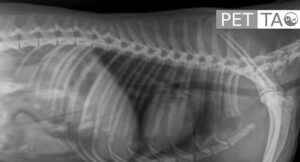Unfortunately, heart disease in dogs is almost as common as heart disease in people.
According to Dr. Ruth MacPete, DVM of Idexx’s Pet Health Network:
Heart disease in dogs is almost as common as it is in humans, but unlike people, smoking and a fatty diet are not risk factors. The most common form of heart disease in dogs is valvular disease, which primarily affects small breed dogs over 5 years of age and makes up 70-75% of heart disease in dogs. Heartworm disease causes 13% of heart disease even though it is entirely preventable. Myocardial disease, such as dilated cardiomyopathy, makes up 8% of heart disease and primarily affects large breed dogs of all ages.
What Is Congestive Heart Failure in Dogs?

There are many potential causes of CHF in dogs, but the two most common are:
- Mitral Valve Insufficiency (MVI): Often referred to as a “leaky valve,” this condition occurs when the mitral valve fails to close properly, allowing blood to flow backward into the left atrium of the heart. Over time, this strain causes the heart to enlarge and pump less efficiently.
- Dilated Cardiomyopathy (DCM): In this disease, the heart muscle becomes weak and enlarged, reducing its ability to contract and circulate blood effectively.
Other causes may include congenital heart defects, heartworm disease, or chronic high blood pressure.

Understanding the underlying causes of CHF is the first step toward managing the condition, whether through modern veterinary medicine, TCVM therapies, or a thoughtful combination of both.
Symptoms of Heart Failure in Dogs
Only a licensed veterinarian can diagnose heart failure in dogs. Because many heart conditions share similar signs with other illnesses, a professional exam and diagnostic testing are essential to understand what’s truly happening in your dog’s body.
Some of the most common symptoms of heart failure include:
- Decreased stamina or exercise intolerance: Your dog may tire
quickly on walks or seem reluctant to play.
- Difficulty breathing: Labored breathing, rapid breathing, or shortness of breath may occur, particularly during periods of rest.
- Persistent coughing: Often worse at night or after activity, coughing may result from fluid buildup in the lungs.
Other possible signs may include fainting, weight loss, a swollen abdomen from fluid accumulation, or restlessness at night.

From a Traditional Chinese Veterinary Medicine (TCVM) perspective, these symptoms reflect weakened Heart Qi and Blood circulation, sometimes combined with Damp accumulation in the lungs. Recognizing these patterns helps guide supportive treatments, such as acupuncture, herbs, and food therapy, alongside Western medicine.
How Veterinarians Diagnose Heart Failure in Dogs
When heart disease is suspected, your veterinarian will use a combination of tests to understand how well your dog’s heart is functioning and to identify the root cause of the problem.
Standard diagnostic tools include:
- Stethoscope exam: The first step is listening to your dog’s heart and lungs with a stethoscope. Your veterinarian will listen for heart murmurs, changes in rhythm, and assess the heart’s strength and function. They’ll also check the lungs for crackling sounds or congestion, which can indicate fluid buildup associated with heart failure.
Chest X-rays: Radiographs allow your veterinarian to evaluate the size, shape, and position of the heart. X-rays also reveal whether fluid is present in the lungs or chest cavity, both of which are common in congestive heart failure.
- Blood and urine tests: Lab work provides valuable insight into how the heart disease is affecting other organs. Because reduced heart function impacts circulation, it often places stress on the liver and kidneys, leading to abnormal test results. These findings help your veterinarian determine the overall impact of the disease.
- Electrocardiogram (ECG): An ECG measures the heart’s electrical activity, offering a detailed look at the heart’s rate and rhythm. It can detect irregular beats, arrhythmias, and conduction abnormalities that may not be obvious during a physical exam.
- Ultrasound (echocardiogram): An ultrasound provides the most complete picture of your dog’s heart in action. Your veterinarian can assess the size and thickness of the heart chambers, check valve function, and measure the heart’s efficiency in pumping blood. This test is beneficial in differentiating between mitral valve disease, dilated cardiomyopathy, and other causes of heart failure.
From a TCVM perspective, diagnosis also involves examining the tongue, pulse, and body condition to identify energetic imbalances such as Qi deficiency, Blood stagnation, or Damp accumulation. When combined with modern diagnostic tools, this dual perspective offers a more comprehensive view of your dog’s health, informing both conventional and holistic treatment choices.
How Heart Qi Tonic Helps Heart Failure in Dogs
Several pharmaceuticals are available to help manage congestive heart failure in dogs, and in many cases, they are necessary to stabilize the condition. However, some veterinarians and pet parents seek ways to complement these medications with natural options—or, when appropriate, to initiate gentler supportive therapies.
In Traditional Chinese Veterinary Medicine (TCVM), heart failure is often viewed as a result of deficient Heart Qi, sometimes combined with Blood stagnation or Damp accumulation in the lungs. When the Heart Qi is weak, circulation slows, fluid accumulates, and the Shen (spirit) may become restless, resulting in fatigue, coughing, and difficulty breathing.

Many dogs tolerate herbal support very well, making it a gentle, tonic alternative—or companion—to pharmaceuticals. When used under veterinary guidance, Heart Qi Tonic can provide additional support for energy, breathing comfort, and overall vitality.
Heart Qi Tonic: Western Philosophy
Heart Qi Tonic helps dogs suffering from:
- Cardiomyopathy
- Chronic fatigue
- Chronic lethargy
- Congestive heart failure
Heart Qi Tonic: Eastern Philosophy
Eastern medicine treats the root cause(s) of a disease rather than its symptoms.
Accordingly, TCVM veterinarians evaluate heart failure in dogs differently from Western veterinarians.
TCVM vets look for signs of imbalance.
Heart Qi Tonic helps dogs with the following TCVM signs:
Weak or irregular pulse
- Heart palpitations
- Heart Qi deficiency
- Lack of energy
- Listlessness
- Pale tongue with a white coating
- Shortness of breath
- Spontaneous sweating
How Heart Qi Tonic Works
Heart Qi Tonic is a TCVM herbal blend containing ten carefully chosen Eastern herbs. These herbs work synergistically to rebalance the body’s systems and meridians, addressing not just the outward signs of disease but also the underlying energetic imbalances that contribute to heart failure in dogs.
In TCVM theory, every illness begins with some form of imbalance. In cases of congestive heart failure, this often involves deficient Heart Qi, sometimes combined with stagnant Blood, Damp accumulation, or weakened Yang. Heart Qi Tonic helps restore balance by tonifying Qi, nourishing and invigorating Blood, and strengthening the Heart’s ability to circulate energy throughout the body. In doing so, it supports both comfort and vitality while gently easing symptoms associated with heart failure.
Key actions of Heart Qi Tonic include:
- Tonifying Heart Qi: strengthens the body’s vital energy and supports heart function
- Invigorating Blood: aids circulation and helps move stagnation
The main ingredients and their roles:
- Bai Zi Ren: Calms the Shen (Spirit) and tonifies Heart Yin and Qi
- Chuan Xiong: Moves Blood and alleviates stagnation
- Dang Gui: Nourishes and invigorates Blood, supporting circulation
- Dang Shen: Tonifies Qi and strengthens digestion and overall vitality
- Fu Ling: Drains Damp, calms the Shen, and strengthens the Spleen
- Gan Cao: Harmonizes the formula and tonifies Qi
- Huang Qi: Tonifies Qi, supports Wei Qi (defensive energy), and strengthens the Heart
- Rou Gui: Warms Yang and unblocks channels to improve circulation
- Wu Wei Zi: Astringes and consolidates Qi, supports fluid balance, and calms the Shen
- Yuan Zhi: Tonifies the Heart, calms the Shen, and supports communication between Heart and Kidney

For best results, Heart Qi Tonic is typically combined with Eastern Food Therapy, proper hydration, and moderate, case-appropriate exercise. These complementary approaches work together to harmonize the body, strengthen vitality, and support long-term heart health.
Note: Information on this site is for educational purposes only and is not meant to substitute the advice provided by your own veterinarian.











